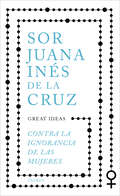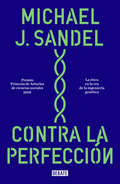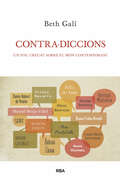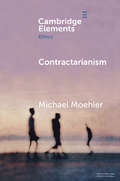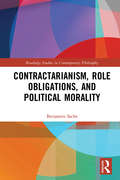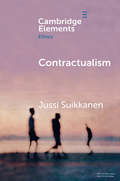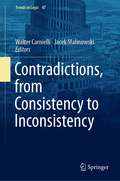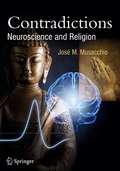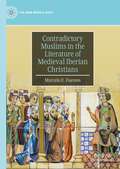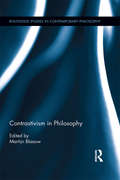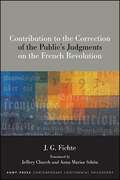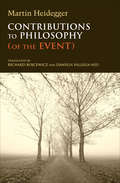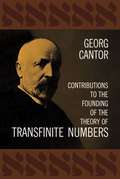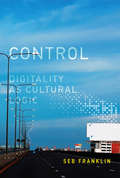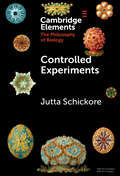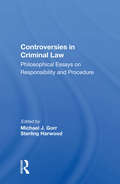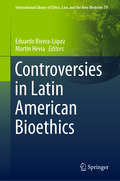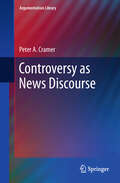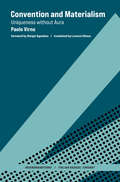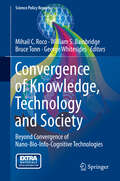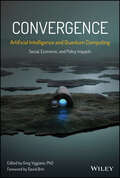- Table View
- List View
Contra la ignorancia de las mujeres
by Juana Inés de la CruzDe la pluma de Sor Juana Inés de la Cruz, un extraordinario documento de feminismo avant la lettre que reclama, en el siglo XVII, el acceso de las mujeres al saber. A lo largo de la historia, algunos libros han cambiado el mundo. Han transformado la manera en que nos vemos a nosotros mismos y a los demás. Han inspirado el debate, la discordia, la guerra y la revolución. Han iluminado, indignado, provocado y consolado. Han enriquecido vidas, y también las han destruido. Taurus publica las obras de los grandes pensadores, pioneros, radicales y visionarios cuyas ideas sacudieron la civilización y nos impulsaron a ser quienes somos. Este extraordinario documento de feminismo avant la lettre se compone de dos cartas que reclaman, ya en el siglo XVII, el acceso de las mujeres al saber. Sor Juana, que usó el hábito para acercarse a las letras, escribe con fuerza y encanto, y estos textos, en parte autobiográficos, son de una riqueza impresionante y sorprenden al conectar con muchas de nuestras preocupaciones actuales.
Contra la perfección: La ética en la era de la ingeniería genética
by Michael J. Sandel¿Qué tiene de malo manipular nuestra naturaleza o la de otros seres? El filósofo Michael Sandel trata de responder a esta pregunta a través de un ameno pero profundo repaso del campo de la bioética. Desde hace tiempo es evidente que la ciencia va más deprisa de lo que nuestras intuiciones morales son capaces de asumir: hoy ya es materialmente posible encargar una mascota exactamente igual que la que acabamos de enterrar; o reivindicar que se asegure que nuestros hijos tendrán las mismas determinaciones genéticas que nosotros, incluso cuando consisten en algo como la sordera. La mayoría de las personas se sienten cuando menos incómodas ante algunas de las posibilidades que abre la ingeniería genética, aunque no siempre les resulta fácil explicar por qué. ¿Qué tiene de malo manipular nuestra naturaleza? ¿Dónde están las líneas rojas, si las hay?Contra la perfección explora estos y otros dilemas morales relacionados con la búsqueda de nuestro propio perfeccionamiento. Sandel argumenta que la búsqueda de la perfección es imperfecta por razones que van más allá de la seguridad y de la equidad, y nos lleva más allá de los familiares términos del discurso político para mostrarnos que la revolución genética transformará el modo en que se discute sobre cuestiones éticas y obligará a reintroducir las cuestiones de orden espiritual en el centro del debate político. Para debatir sobre la ética del perfeccionamiento es preciso abordar preguntas que el mundo moderno ha ignorado desde hace décadas, en gran medida porque bordean el terreno tradicional de la teología. Pero nuestros nuevos poderes en el ámbito de la biotecnología hacen inevitables estas preguntas. Abordarlas es la tarea de este libro, escrito por uno de los filósofos políticos más notables de nuestro tiempo.
Contra-diccions: Un foc creuat sobre el món contemporani
by Beth GaliContra-diccions és el resultat d’una recerca narrativa a través de diàlegs virtuals a catorze bandes que transcorren en espais i temps diferents. Un relat que apassiona per la sinceritat i la claredat com s’expressen les idees i on, sovint, l’autora sembla jugar voluntàriament a fet i amagar amb el lector. El mes de febrer del 2009, Beth Galí viatjà a Bòston per entrevistar Noam Chomsky, professor emèrit del departament de lingüística del Massachusetts Institute of Technology i activista impenitent i mordaç. Aquella primera conversa amb Chomsky va empènyer l’autora a seguir explorant el món contemporani per mitjà de converses amb intel·lectuals, politòlegs, filòsofs, biòlegs, artistes i escriptors, amb els que ha anat teixint una xarxa de diàlegs —convertida més tard en un assaig dialogat— on les converses s’entrellacen i s’organitzen entorn dels temes més candents del moment actual.
Contractarianism (Elements in Ethics)
by Michael MoehlerThis Element provides a systematic defense of moral contractarianism as a distinct approach to the social contract. It elucidates, in comparison to moral conventionalism and moral contractualism, the distinct features of moral contractarianism, its scope, and conceptual and practical challenges that concern the relationship between morality and self-interest, the problems of assurance and compliance, rule-following, counterfactualism, and the nexus between morals and politics. It argues that, if appropriately conceived, moral contractarianism is conceptually coherent, empirically sound, and practically relevant, and has much to offer to contemporary moral philosophy.
Contractarianism, Role Obligations, and Political Morality (Routledge Studies in Contemporary Philosophy)
by Benjamin SachsThis book argues that contractarianism is well suited as a political morality and explores the implications of deploying it in this way. It promises to revive contractarianism as a viable political theory, breaking it free from its Rawlsian moorings while taking seriously the long-standing objections to it. It’s natural to think that the state owes things to its people: physical security, public health and sanitation services, and a functioning judiciary, for example. But is there a theory—a political morality—that can explain why this is so and who the state’s people are? This new contractarianism deploys a reversed state of nature thought experiment as the starting point of political theorizing. From this starting point it develops a political morality: a theory of the common ground of the role moralities attached to the various roles within the state. Contractarianism, so understood, can provide a basis for already popular ideas in political theory—such as political and legal liberalism—and overturn conventional wisdom, for example that the state is obligated to secure justice and that animals should have no legal standing. Contractarianism, Role Obligations, and Political Morality will be of interest to scholars and advanced students working in moral and political philosophy.
Contractualism (Elements in Ethics)
by Jussi SuikkanenThis Element begins by describing T.M. Scanlon's contractualism according to which an action is right when it is authorised by the moral principles no one could reasonably reject. This view has argued to have implausible consequences with regards to how different-sized groups, non-human animals, and cognitively limited human beings should be treated. It has also been accused of being theoretically redundant and unable to vindicate the so-called deontic distinctions. I then distinguish between the general contractualist framework and Scanlon's version of contractualism. I explain how the general framework enables us to formulate many other versions of contractualism some of which can already be found in the literature. Understanding contractualism in this new way enables us both to understand the structural similarities and differences between different versions of contractualism and also to see the different objections to contractualism as internal debates about which version of contractualism is correct.
Contradictions, from Consistency to Inconsistency (Trends in Logic #47)
by Walter Carnielli Jacek MalinowskiThis volume investigates what is beyond the Principle of Non-Contradiction. It features 14 papers on the foundations of reasoning, including logical systems and philosophical considerations. Coverage brings together a cluster of issues centered upon the variety of meanings of consistency, contradiction, and related notions. Most of the papers, but not all, are developed around the subtle distinctions between consistency and non-contradiction, as well as among contradiction, inconsistency, and triviality, and concern one of the above mentioned threads of the broadly understood non-contradiction principle and the related principle of explosion. Some others take a perspective that is not too far away from such themes, but with the freedom to tread new paths. Readers should understand the title of this book in a broad way,because it is not so obvious to deal with notions like contradictions, consistency, inconsistency, and triviality. The papers collected here present groundbreaking ideas related to consistency and inconsistency.
Contradictions: Neuroscience and Religion (Springer Praxis Books)
by José M. Musacchio"Contradictions" is a general interest book that exposes the incompatibility between popular religious beliefs and the scientific view of human nature. It begins with a survey of the evolution of religions and their continuing, often irrational, influences in modern society. Then, based on his long experience in neuroscience, the author takes issue with Decartes about the duality of body and soul. He presents case studies of patients with brain diseases and from these deduces that the soul, far from being separate and supernatural, is no more or less than our way of experiencing our brains ... and which correspondingly disintegrates when they do. Convincing clinical findings and powerful arguments about the universality of truth make this book a bold contribution to the debate about belief and religion in the modern world.
Contradictory Muslims in the Literature of Medieval Iberian Christians (The New Middle Ages)
by Marcelo E. FuentesThis book argues that literary and historiographical works written by Iberian Christians between the twelfth and sixteenth centuries promoted contradictory representations of Muslims in order to advocate for their colonization through the affirmation of Christian supremacy. Ambivalent depictions of cultural difference are essential for colonizers to promote their own superiority, as explained by postcolonial critics and observed in medieval and early modern texts in Castilian, Catalan, and Portuguese, such as the Cantar de mio Cid, Cantigas de Santa Maria, Llibre dels fets, Estoria de España, Crónica geral de 1344, Tirant lo Blanch, and Os Lusíadas. In all these works, the contradictions of Muslim enemies, allies, and subjects allow Christian leaders to prevail and profit through their opposition and collaboration with them. Such colonial dynamics of simultaneous belligerence and assimilation determined the ways in which Portugal, Spain, and later European powers interacted with non-Christians in Africa, Asia, and even the Americas.
Contrastivism in Philosophy (Routledge Studies in Contemporary Philosophy)
by Martijn BlaauwContrastivism can be applied to a variety of problems within philosophy, and as such, it can be coherently seen as a unified movement. This volume brings together state-of-the-art research on the contrastive treatment of philosophical concepts and questions, including knowledge, belief, free will, moral luck, Bayesian confirmation theory, causation, and explanation.
Contribution to the Correction of the Public's Judgments on the French Revolution (SUNY series in Contemporary Continental Philosophy)
by J. G. FichteThe reception history of the French Revolution in France and England is well documented among Anglophone scholars; however, the debate over the Revolution in Germany is much less well known. Fichte's Contribution played an important role in this debate. Presented here for the first time in English, Fichte's work provides a distinctive synthesis of Locke's "possessive individualism," Rousseau's general will, and Kant's moral philosophy. This eclectic blend results in an unusual rights theory that at times veers close to a form of anarchism. Written in 1792–93, just before Fichte moved to Jena to develop his philosophical system in a series of works—above all the Wissenschaftslehre of 1794—the Contribution provides invaluable insight into Fichte's early development. In addition, Fichte's work predates much of Kant's political philosophy, and can shed light on the rich dialogue in German political thought in the 1790s.
Contributions to Law, Philosophy and Ecology: Exploring Re-Embodiments (Law, Justice and Ecology)
by Ruth Thomas-Pellicer Vito De Lucia Sian SullivanContributions to Law, Philosophy and Ecology: Exploring Re-Embodiments is a preliminary contribution to the establishment of re-embodiments as a theoretical strand within legal and ecological theory, and philosophy. Re-embodiments are all those contemporary practices and processes that exceed the epistemic horizon of modernity. As such, they offer a plurality of alternative modes of theory and practice that seek to counteract the ecocidal tendencies of the Anthropocene. The collection comprises eleven contributions approaching re-embodiments from a multiplicity of fields, including legal theory, eco-philosophy, eco-feminism and anthropology. The contributions are organized into three parts: ‘Beyond Modernity’, ‘The Sacred Dimension’ and ‘The Legal Dimension’. The collection is opened by a comprehensive introduction that situates re-embodiments in theoretical context. Whilst closely bound with embodiment and new materialist theory, this book contributes a unique voice that echoes diverse political processes contemporaneous to our times. Written in an elegant and accessible language, the book will appeal to undergraduates, postgraduates and established scholars alike seeking to understand and take re-embodiments further, both politically and theoretically.
Contributions to Philosophy: (Of the Event) (Studies in Continental Thought)
by Martin HeideggerHeidegger&’s second magnum opus after Being and Time, laying the groundwork for his later writing, in a translation of &“impeccable clarity and readability&” (Peter Warnek). Martin Heidegger&’s Contributions to Philosophy, written in the late 1930s and published posthumously in 1989, is now widely viewed as his second magnum opus, after Being and Time. Here, Heidegger lays the groundwork for a new conception of thought and being, rooting them both in the event of appropriation. Here, Heidegger establishes the language and intellectual framework necessary for all of his later writings. Contributions was composed as a series of private ponderings that were not originally intended for publication. They are nonlinear and radically at odds with the traditional understanding of thinking. This translation presents Heidegger in plain and straightforward terms, allowing surer access to this new turn in Heidegger&’s conception of being.
Contributions to the Founding of the Theory of Transfinite Numbers (Dover Books on Mathematics)
by Georg CantorOne of the greatest mathematical classics of all time, this work established a new field of mathematics which was to be of incalculable importance in topology, number theory, analysis, theory of functions, etc., as well as in the entire field of modern logic. It is rare that a theory of such fundamental mathematical importance is expressed so simply and clearly: the reader with a good grasp of college mathematics will be able to understand most of the basic ideas and many of the proofs.Cantor first develops the elementary definitions and operations of cardinal and ordinal numbers and analyzes the concepts of "canlinality" and "ordinality." He covers such topics as the addition, multiplication, and exponentiation of cardinal numbers, the smallest transfinite cardinal number, the ordinal types of simply ordered aggregates, operations on ordinal types, the ordinal type of the linear continuum, and others. He then develops a theory of well-ordered aggregates, and investigates the ordinal numbers of well-ordered aggregates and the properties and extent of the transfinite ordinal numbers.An 82-page introduction by the eminent mathematical historian Philip E. B. Jourdain first sketches the background of Cantor's theory, discussing the contributions of such predecessors as Veicrstrass, Cauchy, Dedekind, Dirichlet, Riemann, Fourier, and Hankel; it then traces the development of the theory by summarizing and analyzing Cantor's earlier work. A bibliographical note provides information on further investigations in the theory of transfinite numbers by Frege, Peano, Whitehead, Russell, etc.
Control: Digitality as Cultural Logic (Leonardo)
by Seb FranklinAn examination of digitality not simply as a technical substrate but also as the logical basis for reshaped concepts of labor, subjectivity, and collectivity.Is there a cultural logic of what we have come to call the information age? Have the technologies and techniques centered on the computer provided not only tools but also the metaphors through which we now understand the social and economic formation of our world? In Control, Seb Franklin addresses the conditions of knowledge that make the concept of the “information economy” possible while at the same time obscuring its deleterious effects on material social spaces. In so doing, Franklin traces three intertwined threads: the relationships among information, labor, and social management that emerged in the nineteenth century; the mid-twentieth-century diffusion of computational metaphors; and the appearance of informatic principles in certain contemporary socioeconomic and cultural practices.Drawing on critical theory, media theory, and the history of science, Franklin names control as the episteme grounding late capitalism. Beyond any specific device or set of technically mediated practices, digitality functions within this episteme as the logical basis for reshaped concepts of labor, subjectivity, and collectivity, as well as for the intensification of older modes of exclusion and dispossession. In tracking the pervasiveness of this logical mode into the present, Franklin locates the cultural traces of control across a diverse body of objects and practices, from cybernetics to economic theory and management styles, and from concepts of language and subjectivity to literary texts, films, and video games.
Controlled Experiments (Elements in the Philosophy of Biology)
by Jutta SchickoreControl is a key ingredient of scientific experimentation; arguably, an uncontrolled intervention or manipulation is not even a genuine experiment. Experiments in the life sciences, however, are notoriously difficult to control due to the complexity and variability of living things. This Element discusses general features of controlled experimentation, epistemic and practical aspects, and historical perspectives. It argues that controlled experimentation has a material-technical and a conceptual side. It shifts the focus from control experiments, comparisons with a control, to the broader issue of controlling for background factors as the epistemologically fundamental issue in experimentation. To understand the nature of controlled experimentation, one needs to consider the making – the design phase – of controlled experiments, particularly the conceptualization and treatment of background factors. The making of controlled experiments is at the same time constitutive for the knowledge that can be gained in the experiment, contingent on a research situation, and historically shaped.
Controversies In Criminal Law: Philosophical Essays On Responsibility And Procedure
by Michael J. Gorr Sterling HarwoodWhen philosophers have turned their attention to criminal law, they have tended to emphasize problems about the criminalization of acts and the justification for the punishment of those who commit such acts. But there has been a recent wave of significant and exciting philosophical work on issues surrounding two other topics in criminal law: Given the performance of a criminal act, what establishes criminal? And what should the state be allowed to use in trying to establish liability? In this carefully edited volume, Michael J. Gorr and Sterling Harwood present a generous selection of papers representing the best of this new work. Avoiding overly abstract pieces in favor of essays that highlight both the philosophical questions and what actually happens on the street and in the courtroom, they have produced a book that is accessible and relevant to the concerns of students. Controversies in Criminal law is an innovative and useful contribution to the teaching of philosophy of law and the foundations of criminal justice. It will be widely used in philosophy departments, law schools, and schools of criminal justice.
Controversies in Latin American Bioethics (International Library of Ethics, Law, and the New Medicine #79)
by Eduardo Rivera-López Martin HeviaThis book offers a first rate selection of academic articles on Latin American bioethics. It covers different issues, such as vulnerability, abortion, biomedical research with human subjects, environment, exploitation, commodification, reproductive medicine, among others. Latin American bioethics has been, to an important extent, parochial and unable to meet stringent international standards of rational philosophical discussion. The new generations of bioethicists are changing this situation, and this book demonstrates that change. All articles are written from the perspective of Latin American scholars from several disciplines such as philosophy and law. Working with the tools of analytical philosophy and jurisprudence, this book defends views with rational argument, and opening for pluralistic discussion.
Controversy as News Discourse (Argumentation Library #19)
by Peter A. CramerThis book presents a constitutive approach to controversy based on a discourse analysis of news texts, focusing on the role of journalists as participants who shape public controversy for readers. Drawing data from the Reuters Corpus, the project identifies formulas that journalists use in reporting controversy and draws conclusions about how these serve professional and textual functions and how they shape public controversy as a natural, historical, and pragmatic event. While the traditions of dialectic and rhetoric have focused on the prescriptive aim of training participants to resolve controversies in philosophical dialogue or public debate settings, this orientation has tended to preempt questions about where controversy is located and how it is shaped. This project contributes to descriptive, ethnographic research about controversy, using discourse analysis to address a problem in argumentation.
Convention and Materialism: Uniqueness without Aura (Insubordinations: Italian Radical Thought)
by Paolo VirnoThe first English translation of the book that established Paolo Virno as one of the most influential Italian thinkers of his generation.With the 1986 publication of this book in Italy, Paolo Virno established himself as one of the most influential Italian thinkers of his generation. Astonishingly, this crucial work has never before been published in an English translation. This MIT Press edition, translated by Italian philosopher and Insubordinations series editor Lorenzo Chiesa, is its first English-language version. Virno here engages, in an innovative and iconoclastic way, with some classical issues of philosophy involving experience, singularity, and the relation between ethics and language, while also offering a profoundly transformative political perspective that revolves around the Marxian notion of the "general intellect." Virno reconsiders Walter Benjamin's idea of a "loss of the aura" (brought on, Benjamin argued, by technical reproducibility), and postulates instead the existence of a new experience of uniqueness that, although deprived of every metaphysical aura, resides in the very process of late-capitalist serial reproduction. Writing after the defeat of contemporary leftist revolutionary movements in the West, Virno argues for the possibility of a "good life" originating immanently from existential and political crises. Taking speculative detours through the thought of philosophers ranging from Aquinas and Berkeley to Heidegger and Wittgenstein, with a specific focus on Kant and Hegel, Virno shows how a renewed reflection on basic theoretical problems helps us to better grasp what is happening now. This edition features a preface written by Virno in 2011.
Convention: A Philosophical Study
by David LewisConvention was immediately recognized as a major contribution to the subject and its significance has remained undiminished since its first publication in 1969. Lewis analyzes social conventions as regularities in the resolution of recurring coordination problems-situations characterized by interdependent decision processes in which common interests are at stake. Conventions are contrasted with other kinds of regularity, and conventions governing systems of communication are given special attention.
Conventional Realism and Political Inquiry: Channeling Wittgenstein
by John G. GunnellWhen social scientists and social theorists turn to the work of philosophers for intellectual and practical authority, they typically assume that truth, reality, and meaning are to be found outside rather than within our conventional discursive practices. John G. Gunnell argues for conventional realism as a theory of social phenomena and an approach to the study of politics. Drawing on Wittgenstein’s critique of “mentalism” and traditional realism, Gunnell argues that everything we designate as “real” is rendered conventionally, which entails a rejection of the widely accepted distinction between what is natural and what is conventional. The terms “reality” and “world” have no meaning outside the contexts of specific claims and assumptions about what exists and how it behaves. And rather than a mysterious source and repository of prelinguistic meaning, the “mind” is simply our linguistic capacities. Taking readers through contemporary forms of mentalism and realism in both philosophy and American political science and theory, Gunnell also analyzes the philosophical challenges to these positions mounted by Wittgenstein and those who can be construed as his successors.
Conventionalism: From Poincaré to Quine
by Yemima Ben-MenahemThe daring idea that convention - human decision - lies at the root both of necessary truths and much of empirical science reverberates through twentieth-century philosophy, constituting a revolution comparable to Kant's Copernican revolution. This 2006 book provides a comprehensive study of Conventionalism. Drawing a distinction between two conventionalist theses, the under-determination of science by empirical fact, and the linguistic account of necessity, Yemima Ben-Menahem traces the evolution of both ideas to their origins in Poincaré's geometric conventionalism. She argues that the radical extrapolations of Poincaré's ideas by later thinkers, including Wittgenstein, Quine, and Carnap, eventually led to the decline of conventionalism. This book provides a fresh perspective on twentieth-century philosophy. Many of the major themes of contemporary philosophy emerge in this book as arising from engagement with the challenge of conventionalism.
Convergence of Knowledge, Technology and Society: Beyond Convergence of Nano-Bio-Info-Cognitive Technologies (Science Policy Reports)
by Mihail C. Roco William S. Bainbridge Bruce Tonn George WhitesidesThis volume aims to document the most important worldwide accomplishments in converging knowledge and technology, including converging platforms, methods of convergence, societal implications, and governance in the last ten years. Convergence in knowledge, technology, and society is the accelerating, transformative interaction among seemingly distinct scientific disciplines, technologies, and communities to achieve mutual compatibility, synergism, and integration, and through this process to create added value for societal benefit. It is a movement that is recognized by scientists and thought leaders around the world as having the potential to provide far-reaching solutions to many of today's complex knowledge, technology, and human development challenges. Four essential and interdependent convergence platforms of human activity are defined in the first part of this report: nanotechnology-biotechnology-information technology and cognitive science ("NBIC") foundational tools; Earth-scale environmental systems; human-scale activities; and convergence methods for societal-scale activities. The report then presents the main implications of convergence for human physical potential, cognition and communication, productivity and societal outcomes, education and physical infrastructure, sustainability, and innovative and responsible governance. As a whole, the report presents a new model for convergence. To effectively take advantage of this potential, a proactive governance approach is suggested. The study identifies an international opportunity to develop and apply convergence for technological, economic, environmental, and societal benefits. The panel also suggests an opportunity in the United States for implementing a program aimed at focusing disparate R and D energies into a coherent activity - a "Societal Convergence Initiative". This study received input from leading academic, industry, government, and NGO experts from the United States, Latin America, Europe, Asia, and Australia.
Convergence: Social, Economic, and Policy Impacts
by Greg ViggianoPrepare for the coming convergence of AI and quantum computing A collection of essays from 20 renowned, international authors working in industry, academia, and government, Convergence: Artificial Intelligence and Quantum Computing explains the impending convergence of artificial intelligence and quantum computing. A diversity of viewpoints is presented, each offering their view of this coming watershed event. In the book, you&’ll discover that we&’re on the cusp of seeing the stuff of science fiction become reality, with huge implications for ripping up the existing social fabric, global economy, and current geopolitical order. Along with an incisive foreword by Hugo- and Nebula-award winning author David Brin, you&’ll also find: Explorations of the increasing pace of technological development Explanations of why seemingly unusual and surprising breakthroughs might be just around the corner Maps to navigate the potential minefields that await us as AI and quantum computing come togetherA fascinating and thought-provoking compilation of insights from some of the leading technological voices in the world, Convergence convincingly argues that we should prepare for a world in which very little will remain the same and shows us how to get ready.
